- sixteenth century
- Alfred Janson
- Charles Burney
- Igor Markevitch
- English Chamber Orchestra
- Alicia Rytlewski: Convergence
- Ravel: Pavane pour une infante défunte
- David Lang
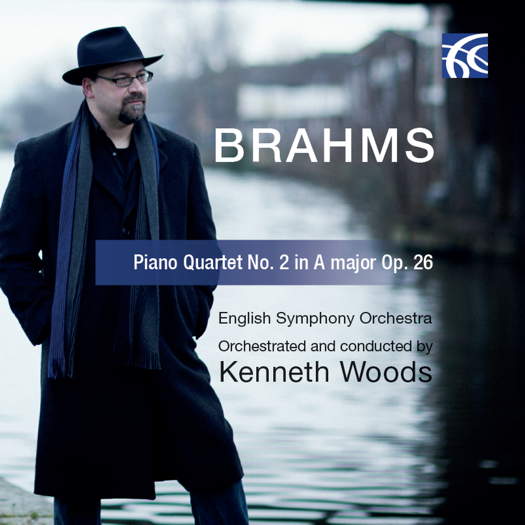 SPONSORED: CD Spotlight. A Very Joyous Disc - Brahms arranged by Kenneth Woods impresses Alice McVeigh.
SPONSORED: CD Spotlight. A Very Joyous Disc - Brahms arranged by Kenneth Woods impresses Alice McVeigh.
All sponsored features >>
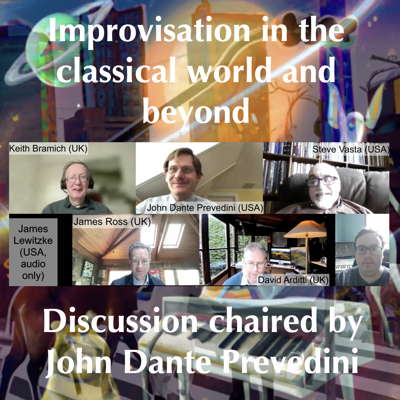 DISCUSSION: John Dante Prevedini leads a discussion about Improvisation in the classical world and beyond, including contributions from David Arditti, James Lewitzke, James Ross and Steve Vasta.
DISCUSSION: John Dante Prevedini leads a discussion about Improvisation in the classical world and beyond, including contributions from David Arditti, James Lewitzke, James Ross and Steve Vasta.
Songs of the Distance
GIUSEPPE PENNISI describes how American music is back, alive and well at the Spoleto Festival
In 1956-57, Gian Carlo Menotti (1911-2007) and Samuel Barber (1910-1981) were looking for a location in central Italy for performances by the young school of American artists emerging during those years, so that they could make themselves known in Europe. Adriano Belli, a lawyer representing the most important Italian opera singers and the founder of the Teatro Lirico Sperimentale, suggested and insisted on his hometown, Spoleto. Its theatres - the 'bourgeois', the Teatro Nuovo, and the 'aristocratic', the Caio Melisso - and the Roman theatre and other spaces (from the castle Rocca degli Albornoz to churches and squares) could all become places of entertainment.
Gradually, especially in the final quarter of the last century, Spoleto Festival's characteristic of being dedicated to the 'two worlds' seemed to have been almost forgotten. It resumes in a big way in this edition which began at the end of June 2022 and involves sixty shows and eighteen venues over seventeen days. The number of curtain raises is almost similar to that of the summer session of the Ravenna Festival which extends over two months and has an autumn session dedicated to opera music.
From 1956-57 to today, however, the situation has drastically changed: young American artists work greatly in Europe, while Europeans and Italians in particular know little about modern American music. An example: last spring two works taken from Italian novels debuted in the USA: Il giardino dei Finzi Contini and Il Gattopardo. They were so successful that The New York Times dedicated a full page to them, while no Italian newspaper - not even the five monthly magazines dedicated to music - wrote a single line. It would be desirable that the 'new' American opera that has great success in France and Germany - for example, those by Jake Heggie - be hosted, at least one title a year, in Spoleto.
The festival opened on 24 June 2022 with a concert by the Budapest Festival Orchestra conducted by Iván Fischer. The ensemble performed, for the first time in Europe, the great oratorio The Passion of Ramakrishna by Philip Glass, and started the concert with Bach's Orchestral Suite No 4 in D. The orchestra was joined by the chorus of the Accademia Nazionale di Santa Cecilia, in the name of the collaboration between the two institutions. The musical proposal is particularly rich thanks to the presence of the two groups.
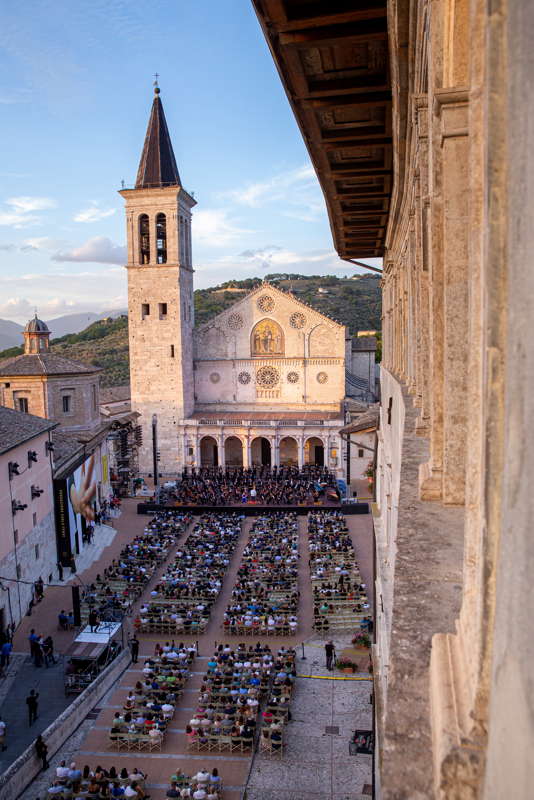
The scene in Spoleto where Iván Fischer conducts the Budapest Festival Orchestra and the chorus of the Accademia Nazionale di Santa Cecilia. Photo © 2022 Andrea Veroni
The Budapest musicians' work continued at the Teatro Caio Melisso Spazio Carla Fendi (24-26 June) with chamber music: for the 'midday concerts'. At the centre of the musical program there is Barbara Hannigan, Canadian soprano and conductor, a world star whose voice is among the most original and requested on the contemporary scene. Her residence in Spoleto is closely linked to that of the Orchestra dell'Accademia Nazionale di Santa Cecilia, with which she shares the stage of Piazza Duomo for two evenings. On Saturday 2 July 2022, she is the conductor and singer of La voix humaine, in her original interpretation of the masterpiece by Francis Poulenc and Jean Cocteau. She combines it with Metamorphosen by Richard Strauss. There are two concerts with Antonio Pappano: on Sunday 10 July, Barbara Hanningan is the interpreter of Fascinating Rhythm by George Gershwin in the midday concert and Knoxville: Summer of 1915 by Samuel Barber, for the grand finale of the Festival that Antonio Pappano dedicates to the great American composers with the Symphony No 3 by Aaron Copland. Much awaited is the concert on Sunday 3 July (at Teatro Romano): Barbara Hannigan accompanied by pianist Stephen Gosling interprets Jumalattaret, a cycle of songs composed for her by John Zorn and inspired by the Finnish poem Kalevala, which tests her technical and expressive vocal possibilities, considered at the limit of human possibility.
The journey through American music continues with the series of concerts of the Ensemble Sentieri Selvaggi (1-3 July 2022 at Teatro Caio Melisso Spazio Carla Fendi), led by its artistic director Carlo Boccadoro. In three different programs, the ensemble builds a mosaic of voices to be discovered, from the great protagonists of minimalism such as Philip Glass, Steve Reich and Terry Riley.
I was in Spoleto on the first weekend of the festival (24-26 June) and I saw three shows. These are my comments in brief. The Passion of Ramakrishna shows, as always, a minimalist Philip Glass centred on a light writing, but it is opened by a brass fanfare and the use of percussion, especially in separating the four 'scenes' and the 'epilogue' in which the oratorio is divided. For its spiritual character and the central role of the choir it recalls Quo Vadis by Polish composer Feliks Nowowiejski (1877-1946), written back in 1909. A few months ago, this oratorio debuted in Rome (at the Palladium Theater of the Third State University of the capital) and had its first version on DVD. (In Poland, after great successes before the First World War, it was almost banned for decades.)
In this work by Glass, the chorus is the voice of the protagonist, an Indian mystic of the late nineteenth century, dying of cancer among great sufferings. The libretto, in English, is 'compiled and revised' by Kusumita P Pedersen, based on texts attributed to Ramakrishna himself, whose sufferings and 'farewell to life' are very vivid. At the same time, the master's words are comforting. This is best shown by the English text, which in the program notes is presented in front of the Italian translation. It is always difficult to grasp the nuances when switching from one language to another. The chorus is not only the voice of the protagonist. Not only does it impersonate Ramakrishna but some of the singers also give voice to minor characters of what is a real stage action. There are two other prominent characters: narrator Mahendranath Gupta (sung by the excellent baritone Peter Harvey, who took over from a sick colleague) and Sarada Devi, Ramakrishna's wife (sung by soprano Maria Stella Maurizi), who assists her dying husband.
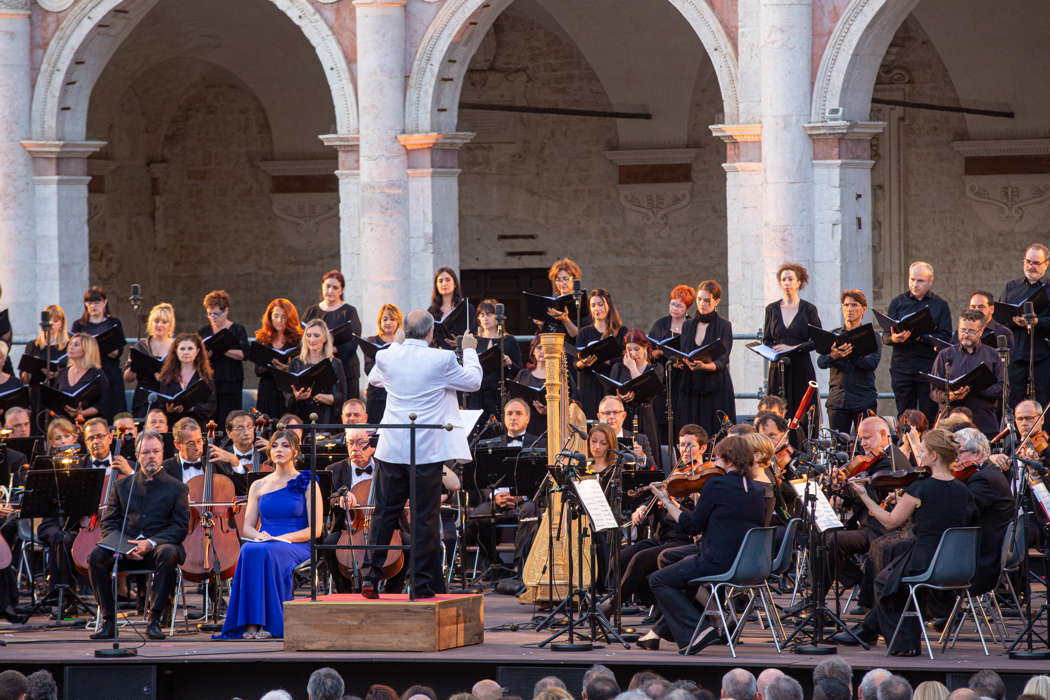
The Passion of Ramakrishna by Philip Glass: Peter Harvey and Maria Stella Maurizi with Iván Fischer and the Budapest Festival Orchestra and the chorus of the Accademia Nazionale di Santa Cecilia. Photo © 2022 Andrea Veroni
The audience, certainly not accustomed to music by Philip Glass, responded with real enthusiasm to the performance, and there were applause and ovations for chorus, orchestra and soloists. I hope that the concert will stimulate some Italian opera foundation to stage a complete work by Glass. The Bach orchestral suite, with which the evening opened, perhaps fearing that Glass's oratorio (of about an hour) was too short for the inauguration of the Festival, had applause of mere courtesy: the musical ensemble was too large and the Piazza Duomo too vast for a work designed for a hall containing a few aristocrats.
In the chamber music concert at the Teatro Caio Melisso, the second part (from which it takes its title) is more important, and was more awaited, than the first. Little is known about Gian Carlo Menotti's Canti della lontananza (Songs of the distance, presented here in a transcription for voice and ensemble by Orazio Sciortino). There are those who believe that they were not successful, as they were judged inferior to Menotti's works for the stage. I believe, however, that Menotti (who was a shy person) kept them to himself: seven miniatures composed on seven beautiful poems that speak to the intimate about the intimate. Written for an exceptional soprano: Elisabeth Schwarzkopf and pianist Martin Isepp, Canti della lontananza debuted in 1967 at Hunter College in New York. I have misgivings about the advisability of transcribing them for chamber orchestra. Without a doubt, there are not many singers with the qualities of Schwarzkopf, but it seemed inappropriate to entrust them to the young Giulia Peri, correct in the emission but with a diction difficult to understand - in Canti della lontananza, understanding the text is essential.
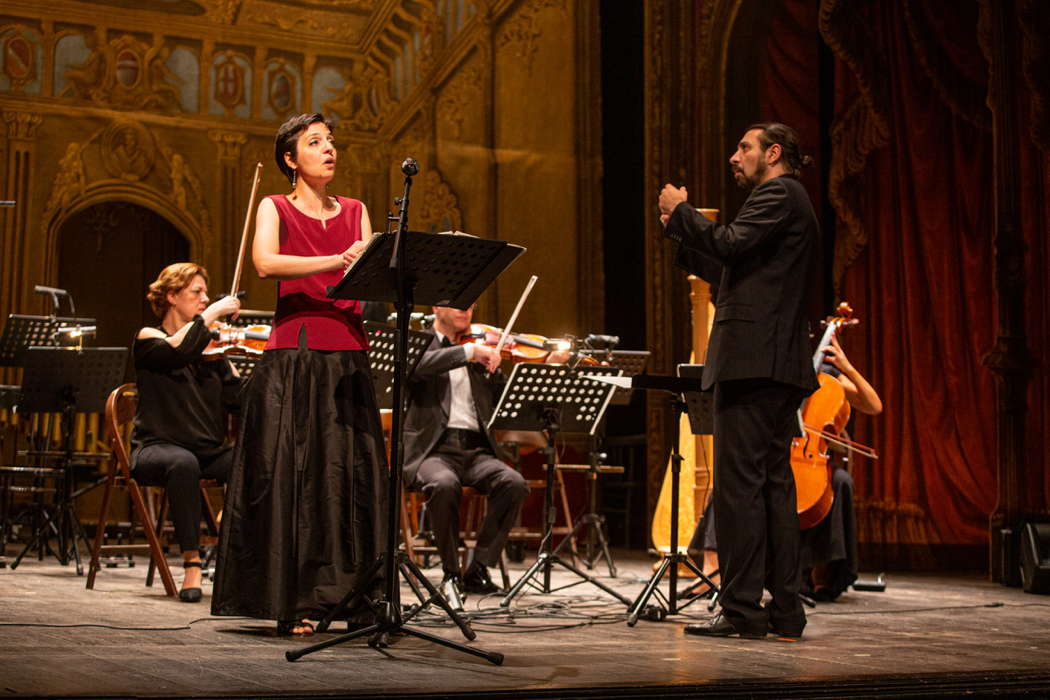
Menotti's Canti della lontananza, sung by Giulia Peri. Photo © 2022 Andrea Veroni
Finally, in Teatro San Simone on 25 June 2022, I saw Le crocodile trompeur / Didon et Enée by a 'theatrical and musical collective' successful in France. This musical play has, on paper, all the titles to be presented in a major international festival. It made its debut in 2013 at the Théâtre des Bouffes du Nord - the one, to be clear, made internationally known by Peter Brook and Stéphane Lissner - with great success and obtaining the most coveted firsts of the theatrical scene in France. Re-staged in 2021 since then, with a dozen co-producers, it has been touring theatres in France and Switzerland. However, more than 'théâtre musical', it is a vaudeville that takes its cue from Purcell's masterpiece Dido and Aeneas, slightly ridiculing its central situation - the queen who commits suicide for the man who prefers his own career.
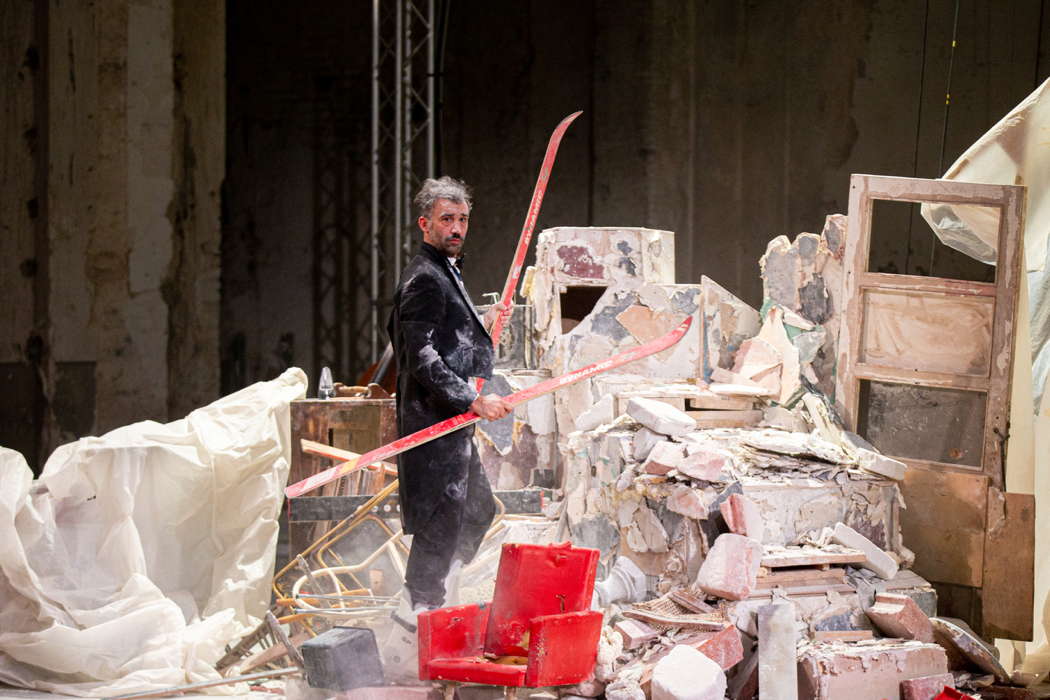
A scene from Le crocodile trompeur / Didon et Enée at the 2022 Spoleto Festival. Photo © 2022 Andrea Veroni
The vaudeville, however, has a lightness that this example of 'théâtre musical' does not have - some jokes and situations are frankly heavy - and is usually short: Le crocodile trompeur / Didon et Enée lasts two and a half hours without intermission, while Dido and Aeneas runs for about forty-five minutes. The laughter during the show and the warm applause at the end indicated that the audience had a good time ... your reviewer a little less so.
Copyright © 29 June 2022
Giuseppe Pennisi,
Rome, Italy



